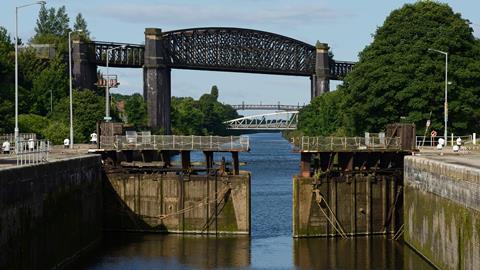The operators of the historic waterway the Manchester Ship Canal can bring a private law claim against the local water utility over unauthorised discharges of sewage, seven Supreme Court justices ruled unanimously today. The decision, in The Manchester Ship Canal Company v United Utilities Water Ltd overturns High Court and Court of Appeal rulings that no such cause of action was available because of the provisions of the 1991 Water Industry Act, which privatised the sector.
In lead judgment, Lord Reed, president and Lord Hodge said the case raised the question whether the owners of watercourses or bodies of water can bring actions in nuisance or trespass in the event that the water is polluted by discharges of foul water from sewerage undertakers. United Utilities has some 100 outfalls from which foul water is designed to be discharged when the capacity of the system is exceeded. 'This could be avoided if United Utilities invested in improved infrastructure and treatment processes,' the justices note.
In the case, the company which owns the 36-mile Victorian waterway sought damages for nuisance and trespass. United Utilities applied for dismissal on the basis that it had inherited a pre-existing implied statutory power to discharge water and treated effluent into private watercourses without the owners’ consent. Overturning the lower courts' rulings in favour of the utility, the Supreme Court justices said a common law remedy against nuisance survives the provisions of the 1991 act, which contains 'no express ouster of all common law causes of action and remedies to protect the enjoyment of the property'.
'If the discharges constitute a trespass (a matter on which we express no view), United Utilities is the body responsible for the commission of that tort. If the discharges constitute a nuisance, that is something which United Utilities has caused or adopted, since its sewerage system is designed in a way that deliberately involves the discharge of effluent into the canal when the hydraulic capacity of the system is exceeded,' Lords Reed and Hodge concluded. Lord Lloyd-Jones, Lord Burrows, Lord Stephens, Lady Rose and Lord Richards agreed.
The Supreme Court's ruling could have wider implications. Emma Montlake, joint executive director of the Environmental Law Foundation, which intervened in the case, said the outcome ‘has the potential to be a game changer for communities up and down the land’.
'Owners of waterways may now consider taking action against sewerage undertakers for polluting water, and it is very possible that we could now see an increase in this type of legal claim,' said Andrew Ross, partner at Charles Russell Speechlys.
On X, well-known activist and former pop star Feargal Sharkey commented:
This is massive
— Feargal Sharkey (@Feargal_Sharkey) July 2, 2024
Supreme Court rules WCs can sued for nuisance or trespass for dumping sewage even if “There has been no negligence or deliberate misconduct”, by the WC
That opens the way for 1,000s of claims by fishing clubs, swimmers, riparian owners against WCs. WOW just WOW! pic.twitter.com/TYgQIxEJRX
This article is now closed for comment.




























13 Readers' comments